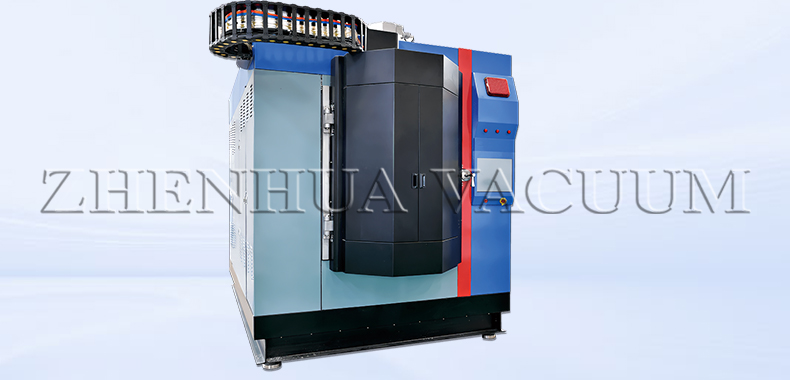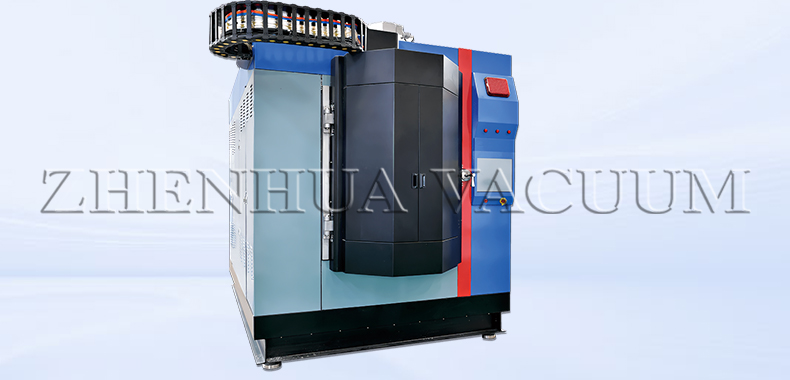Welcome to Guangdong Zhenhua Technology Co.,Ltd.
Industry News
-

Components of vacuum coating equipment
Vacuum coating equipment is typically composed of several key components, each with its own specific function, that work in concert to achieve efficient, uniform film deposition. Below is a description of the main components and their functions: Main Components Vacuum chamber: Function: Provides...Read more -

Thermal Evaporative Coating System Working Principle
Evaporative coating equipment is a kind of equipment used to deposit thin film materials on the surface of the substrate, which is widely used in the fields of optical devices, electronic devices, decorative coatings and so on. Evaporative coating mainly utilizes high temperature to convert solid...Read more -
Inline Coater Introduction
A vacuum inline coater is an advanced type of coating system designed for continuous, high-throughput production environments. Unlike batch coaters, which process substrates in discrete groups, inline coaters allow substrates to move continuously through various stages of the coating process. Her...Read more -
Sputtering Vacuum Coater
A sputtering vacuum coater is a device used to deposit thin films of material onto a substrate. This process is commonly used in the production of semiconductors, solar cells, and various types of coatings for optical and electronic applications. Here’s a basic overview of how it works: 1.V...Read more -
Vacuum Coating System Introduction
A vacuum coating system is a technology used to apply a thin film or coating to a surface in a vacuum environment. This process ensures a high-quality, uniform, and durable coating, which is crucial in various industries such as electronics, optics, automotive, and aerospace. There are different ...Read more -
What is sputtering optical in-line vacuum coating systems
Magnetron sputtering optical in-line vacuum coating systems are an advanced technology used to deposit thin films onto a variety of substrates, there are commonly used in industries such as optics, electronics and materials science. The following is a detailed overview: Components and features: 1...Read more -

Diamond thin films technology-chapter2
(3) Radio Frequency Plasma CVD (RFCVD)RF can be used to generate plasma by two different methods, the capacitive coupling method and the inductive coupling method.RF plasma CVD uses a frequency of 13.56 MHz.The advantage of RF plasma is that it diffuses over a much larger area than microwave plas...Read more -

Diamond thin films technology-chapter 1
Hot filament CVD is the earliest and most popular method of growing diamond at low pressure. 1982 Matsumoto et al. heated a refractory metal filament to over 2000°C, at which temperature the H2 gas passing through the filament readily produces hydrogen atoms. The production of atomic hydrogen dur...Read more -
What are the classifications of vacuum coating equipment?
Vacuum coating technology is a technology that deposits thin film materials onto the surface of substrate materials under vacuum environment, which is widely used in electronics, optics, packaging, decoration and other fields. Vacuum coating equipment can be mainly divided into the following type...Read more -
How to choose a good brand of vacuum coating equipment?
Vacuum coating equipment is a kind of equipment for surface modification using vacuum technology, which mainly includes vacuum chamber, vacuum system, heat source system, coating material and so on. At present, vacuum coating equipment has been widely used in automotive, mobile phones, optics, se...Read more -
Vacuum Ion Coating Technology Introduction
1.The principle of vacuum ion coating technology Using vacuum arc discharge technology in a vacuum chamber, arc light is generated on the surface of the cathode material, causing atoms and ions to form on the cathode material. Under the action of electric field, the atom and ion beams bombard the...Read more -
Sputtering Coating Machine Technical Features
Vacuum magnetron sputtering is particularly suitable for reactive deposition coatings. In fact, this process can deposit thin films of any oxide, carbide, and nitride materials. In addition, the process is also particularly suitable for the deposition of multilayer film structures, including opti...Read more -
DLC Technology Introduction
“DLC is an abbreviation of the word “DIAMOND-LIKE CARBON”, a substance composed of carbon elements, similar in nature to diamond, and having the structure of graphite atoms. Diamond-Like Carbon (DLC) is an amorphous film that has attracted the attention of the tribological commu...Read more -

Properties and applications of diamond films chapter 2
Electrical properties and applications of diamond films Diamond also has a forbidden bandwidth, high carrier mobility, good thermal conductivity, high saturation electron drift rate, small dielectric constant, high breakdown voltage and electron hole mobility, etc. Its breakdown voltage is two or...Read more -

Properties and applications of diamond films chapter 1
Diamond formed with strong chemical bonding has special mechanical and elastic properties. The hardness, density and thermal conductivity of diamond are the highest among known materials. Diamond also has the highest modulus of elasticity of any material. The coefficient of friction of a diamond ...Read more







